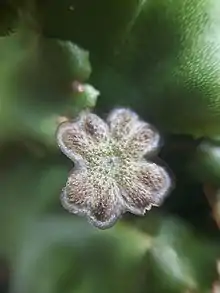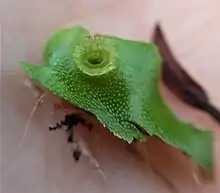| Marchantia berteroana | |
|---|---|
 | |
| Marchantia berteroana, with female gametangia known as archegoniophores | |
| Scientific classification | |
| Kingdom: | Plantae |
| Division: | Marchantiophyta |
| Class: | Marchantiopsida |
| Order: | Marchantiales |
| Family: | Marchantiaceae |
| Genus: | Marchantia |
| Species: | M. berteroana |
| Binomial name | |
| Marchantia berteroana | |


Marchantia berteroana is a liverwort species in the genus Marchantia.
Description
Marchantia berteroana is a flat, thalloid liverwort, with thallus up to 2cm long and 1.2cm wide. The thallus colour can range from dark green to yellow with a glossy surface, and is attached to the ground via rhizoids. Under a lens, pores can be seen on the upper surface. The gametangia (sex organs) grow vertically from the thallus, the plant is dioicous so individual plants produce male or female gametangia.[1] The male gametangia are called an antheridiophores, they are short with a flat disc-like structure which is approximately 1cm wide. The female gametangia are called archegoniophores, they have a taller stem and an umbrella-like structure at the top, approximately 1cm wide, from which the common name is derived. They also reproduce asexually via gemma cups which form on the surface of the thallus, they are approx. 4mm wide and 3mm high.[2] Gemma cups appear on the thallus more commonly in winter[3] when rainfall is higher, as raindrops are required to disperse the gemmules.
Marchantia berteroana contains the flavones isoscutellarein and hypolaetin 8-glucuronides.[4] The composition and amount of these chemicals changes seasonally depending on the reproductive state of the plant, when gametangia are present there is an absence of acacetin and its glycosides.[3]
Similar species
Marchantia polymorpha is a similar in appearance, it can be distinguished from M. berteroana by the colour of the thallus, M. polymorpha is a dull green and often has a dark streak in the middle of the upper surface.[5] M. berteroana has brighter green thallus and usually no streaks on the upper surface. M. beteroana also has transparent scales on the underside of the thallus which help distinguish it from Marchantia foliacea which has dark purple/brown scales.[6]
Ecology
Distribution
Marchantia berteroana can be found in Australia, New Zealand, Southern Africa,[7] South America,[8] Antarctica[9] and, non-continental locations such as Papua New Guinea, Java, New Caledonia and various smaller islands.[10]
Habitat
M berteroana prefers moist environments such as near fresh water sources, waterfall splash zones and, forest floors.[11] It is also known to be one of the first colonising species after bushfire in Tasmanian mixed forests.[12][13]
Reproduction
See Marchantia
References
- ↑ "Marchantia berteroana | PlantZAfrica".
- ↑ "T.E.R:R.A.I.N - Taranaki Educational Resource: Research, Analysis and Information Network - Marchantia berteroana (Umbrella liverwort)".
- 1 2 Markham, Kenneth R.; Moore, Noreen A.; Porter, Lawrence J. (January 1978). "Changeover in flavonoid pattern accompanying reproductive structure formation in a bryophyte". Phytochemistry. 17 (5): 911–913. doi:10.1016/S0031-9422(00)88645-8.
- ↑ Markham, Kenneth R.; Porter, Lawrence J. (April 1975). "Isoscutellarein and hypolaetin 8-glucuronides from the liverwort Marchantia berteroana". Phytochemistry. 14 (4): 1093–1097. doi:10.1016/0031-9422(75)85194-6.
- ↑ "Key to Tasmanian Dicots".
- ↑ "Key to Tasmanian Dicots".
- ↑ "Marchantia berteroana | PlantZAfrica".
- ↑ Luth, M., & Schafer-Verwimp, A. (2004). Additions to the Bryophyte Flora of the Neotropics. Tropical bryology, 7-17.
- ↑ Davey, Martin C. (3 February 1997). "Effects of physical factors on photosynthesis by the Antarctic liverwort Marchantia berteroana". Polar Biology. 17 (3): 219–227. doi:10.1007/s003000050125. S2CID 8748296.
- ↑ "Bryogeography - Australia and far away - bryophyte".
- ↑ "Marchantia berteroana | PlantZAfrica".
- ↑ "Tasmania - recolonisation after fire - bryophyte".
- ↑ Duncan, Diana; Dalton, P.L. (18 July 2013). "Recolonisation by bryophytes following fire". Journal of Bryology. 12 (1): 53–63. doi:10.1179/jbr.1982.12.1.53.